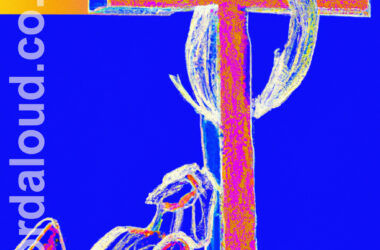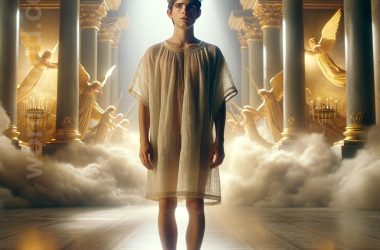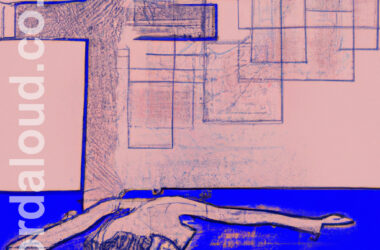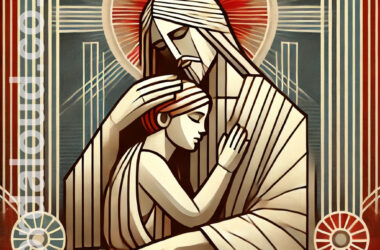In this poem, Herbert reflects on the limits of human strength and importance of divine assistance. The poem begins with the modest admission that ‘to write a verse or two is all the praise, / That I can raise’, indicating that any expression of gratitude or devotion Herbert offers to God is inherently limited. This acknowledgment of inadequacy runs throughout the poem, shaping a tone of humility and dependence on divine strength [ … ]
Poems With Jesus | Christian Faith In Poetry
George Herbert | The Temple | Praise (1) | Church | Christian Poems | Metaphysical Poetry
In this poem, Herbert reflects on the limits of human strength and importance of divine assistance. The poem begins with the modest admission that ‘to write a verse or two is all the praise, / That I can raise’, indicating that any expression of gratitude or devotion Herbert offers to God is inherently limited. This acknowledgment of inadequacy runs throughout the poem, shaping a tone of humility and dependence on divine strength [ … ]
George Herbert | The Temple | Grace | Church | Christian Poems | Metaphysical Poetry
In this poem, Herbert expresses a yearning for divine grace to enliven and sustain his spiritual life. Herbert begins by admitting a sense of spiritual stagnation, stating, ‘My stock lies dead, and no increase / Doth my dull husbandry improve.’ Here, Herbert characterizes his inner resources or spiritual vitality as unproductive, and he attributes this lack to his own insufficient efforts, likened to a ‘dull husbandry’, or poor cultivation. This admission reveals Herbert’s dependence on external, divine intervention for renewal, as he implores grace to ‘drop from above’ [ … ]
George Herbert | The Temple | Whitsunday | Church | Christian Poems | Metaphysical Poetry
In this poem, often titled Whitsunday or The Feast of Pentecost, Herbert reflects on the power and presence of the Holy Spirit as he calls for divine inspiration and renewal. The poem begins with a personal appeal, where the poet speaks directly to the ‘sweet Dove’, a metaphor for the Holy Spirit, asking the Spirit to listen and take residence within him. This opening conveys a desire for a profound inner transformation, as Herbert hopes the Spirit will ‘hatch’ his heart, suggesting a period of nurturing and growth that will ultimately enable him to ‘fly away’ spiritually [ … ]
George Herbert | The Temple | The Holy Scriptures (2) | Church | Christian Poems | Metaphysical Poetry
This poem reflects George Herbert’s meditative approach to the relationship between Scripture and human understanding. He portrays the Bible as a source of ‘lights’ and ‘constellations’ whose complexity and hidden meanings illuminate human experience. Herbert expresses a desire to understand the Bible not just as individual verses but as a unified whole, where each part contributes to a larger, interconnected narrative. The ‘lights’ and ‘configurations of their glory’ in the poem evoke a metaphorical night sky, where each verse shines like a star. Herbert suggests that, like stars forming constellations, individual passages in scripture connect in ways that provide a grander, cohesive vision [ … ]
George Herbert | The Temple | The Holy Scriptures (1) | Church | Christian Poems | Metaphysical Poetry
In this poem, George Herbert reflects on the Bible, addressing it as a source of spiritual richness, healing, and profound wisdom. The poem opens with a direct address, calling the Bible an ‘infinite sweetness’ that nourishes the heart, suggesting that its contents offer a spiritual sustenance likened to honey, a substance both soothing and medicinal. Herbert compares the Bible’s words to a form of healing that reaches into any grief or pain one may experience, with the power to bring comfort and relief to the soul [ … ]
George Herbert | The Temple | Jordan (1) | Church | Christian Poems | Metaphysical Poetry
This poem challenges the convention that poetry must rely on embellishment, elaborate imagery, or artifice to be meaningful or beautiful. Herbert begins with rhetorical questions that critique the idea that only fiction or outward, artificial beauty can be the subjects of verse: ‘Who says that fictions only and false hair / Become a verse? Is there in truth no beauty?’ This opening begins the thought of Herbert’s argument that truth and simplicity have their inherent worth in poetry [ … ]
George Herbert | The Temple | The Temper (2) | Church | Christian Poems | Metaphysical Poetry
The poem explores themes of divine presence, spiritual longing, and human instability. The poem opens with a stark reflection on the transient nature of spiritual joy and the sudden void that follows when such joy is absent. Herbert questions the disappearance of an overwhelming sense of divine joy that had recently consumed his heart, seeking an explanation or resolution from God. This inquiry sets the stage for a meditation on the balance between divine grace and human imperfection [ … ]
George Herbert | The Temple | The Church | Love (2) | Christian Poems | Metaphysical Poetry
This poem is a meditation on divine love and its transformative power. Herbert calls upon an ‘Immortal Heat’, a metaphor for God’s eternal love, to burn away human desires, preparing the soul for a purified relationship with the divine. Herbert asks that this heavenly fire ‘attract the lesser to it’, symbolizing the hope that earthly passions, with all their distractions and imperfections, will be drawn into the higher, refining flame of divine love. The fire that ‘shall consume the world’ is a vision of divine judgment or renewal that should first be felt within, turning Herbert’s own heart toward a sincere devotion [ … ]
George Herbert | The Temple | The Church | Love (1) | Christian Poems | Metaphysical Poetry
In this poem, Herbert reflects on humanity’s misplaced admiration and affection, which is directed at transient, earthly beauty rather than at God, the ‘Immortal Love’ and creator of all things. The poem begins by acknowledging God as the creator of the world’s beauty—a beauty that ‘can never fade’—and contrasts this with humanity’s inclination to direct love toward earthly, perishable objects. Humanity’s focus on ‘mortal love’ instead of divine love results in a separation from God, as people are captivated by temporary creations rather than the Creator [ … ]
George Herbert | The Temple | The Church | Antiphon (1) | Christian Poems | Metaphysical Poetry
The poem emphasizes universality and inclusivity of divine worship, suggesting that the entire world resounds with praise for God. The refrain, ‘Let all the world in every corner sing, / My God and King,’ creates a communal call to worship through the poem [ … ]
George Herbert | The Temple | The Church | Holy Communion | Christian Poems | Metaphysical Poetry
This poem centres on themes of spiritual nourishment and intimate connection between the divine and the individual soul. The poem begins by contrasting superficial wealth, symbolized by ‘rich furniture’ and ‘a wedge of gold’, with the poet’s experience of spiritual fulfilment. Here, material objects hold no power to convey the divine presence. Instead, the poet emphasizes a more personal and humble approach: sustenance provided by Christ in the Eucharist, which enters into the poet ‘by the way of nourishment and strength’. This nourishment implies a steady, almost unseen influence that fills the body and soul, offering rest and inner strength while combating the forces of sin [ … ]
George Herbert | The Temple | The Church | Prayer (I) | Christian Poems | Metaphysical Poetry | Love Of Jesus Christ
The poem is a meditation on the nature of prayer. It is a sonnet with no narrative or direct progression, composed of sixteen images, each evoking different dimensions of prayer. There is no main verb in the poem; it flows as a series of phrases that describe prayer without explicitly saying what it does. A list of metaphors feels simultaneously boundless and encompassing, as Herbert seeks to communicate prayer’s role, impact, and place within the human and divine realms [ … ]
George Herbert | The Temple | The Church | Repentance | Christian Poems | Metaphysical Poetry
The poem explores themes of human frailty, sin, repentance, and divine mercy. The poem reflects on the brevity and vulnerability of life, contrasting human weakness with the power of God’s compassion. The poet, Herbert, begins by confessing the greatness of his sin and acknowledging the fleeting nature of human existence. The image of life as a ‘quick flower’ or ‘momentary bloom’ emphasizes this transience. Life is presented as something that is constantly ‘undressing’ or stripping away, ultimately leading toward death, which is depicted as the inevitable destination [ … ]
George Herbert | The Temple | The Church | Affliction (1) | Christian Poems | Metaphysical Poetry
The poem explores the spiritual journey of the poet, George Herbert, reflecting Herbert’s initial enthusiasm for the religious life and his later struggles with faith, disappointment, and suffering. The poem opens by recalling the poet’s early attraction to divine service, which he finds ‘brave’ and full of joy. He describes an idealized experience of religious devotion, where he expected to receive numerous blessings, both from his natural pleasures and the added benefits of God’s grace. At this stage, the poet sees everything in a positive light, imagining that both heaven and earth will provide him with endless happiness [ … ]
George Herbert | The Temple | The Church | Sinne (1) | Christian Poems | Metaphysical Poetry
The poem reflects on the numerous protective measures placed around individuals to guide them toward moral and spiritual growth, only to suggest that a single powerful sin can undo all these efforts. The poem opens by marvelling at the care with which human life is surrounded by formative influences, beginning with parents who ‘season’ or shape their children. This is followed by teachers, who hand them over to the ‘laws’ and ‘rules of reason’. These influences represent a rational, structured upbringing designed to lead a person towards a virtuous and ordered life [ … ]
George Herbert | The Temple | The Church | Nature | Christian Poems | Metaphysical Poetry | Faith In Jesus
The poem reflects an inner struggle between rebellion and submission to divine authority, expressing the poet’s desire to resist God but also recognition of the futility of doing so. The first stanza presents the poet’s rebellious spirit, where he admits to wanting to die, fight, or deny God’s influence over him. This opposition to God’s control is portrayed as a natural inclination of the poet’s heart, which he acknowledges as a stronghold that resists divine authority. However, the poet also requests that God tame his heart, recognizing that the ultimate skill or ‘highest art’ of God is to bring even the strongest opposition into submission. This sets the poem’s central theme of rebellion versus surrender [ … ]
George Herbert | The Temple | The Church | Holy Baptism (2) | Christian Poems | Metaphysical Poetry
The poem contemplates the nature of spiritual growth and the relationship between the soul and the body in a Christian context. It begins with a recognition of the ‘narrow way and little gate’, referencing a biblical metaphor for the difficult path of righteousness (Matthew 7:13-14). The poet reflects on his early spiritual awakening (‘on my infancy / Thou didst lay hold’) and the idea that God preemptively initiated his faith before he could fully comprehend it (‘antedate my faith in me’). This expresses the belief that faith is a gift from God, implanted at an early stage [ … ]
George Herbert | The Temple | The Church | Holy Baptism (1) | Christian Poems | Metaphysical Poetry
The poem centres on a reflection of sin and redemption, using a natural metaphor to illustrate the poet’s spiritual journey. In the opening lines, the poet likens himself to someone who stands at the edge of a dark, shadowy grove but looks beyond it toward the sky. This image suggests the poet’s desire to move past his sins, as represented by the grove, and seek out the purity and grace symbolized by the open sky above. Rather than remaining fixated on his wrongdoings, he wishes to direct his gaze toward salvation [ … ]
George Herbert | The Temple | The Church | Easter-Wings | Christian Poems | Metaphysical Poetry
The poem reflects a meditation on human suffering and redemption, as well as a call for divine assistance to transcend the human condition. It is structured in two stanzas, each beginning with the poet’s reflection on human limitations, followed by a plea for union with God, and concluding with a hope for spiritual elevation [ … ]
George Herbert | The Temple | The Church | Easter | Christian Poems | Metaphysical Poetry
The poem is an expression of praise and resurrection, where the poet calls upon his ‘heart’ to celebrate the Lord’s resurrection and to rise spiritually with Him. The poem opens with a command to the heart to ‘Rise’ in response to the Lord’s resurrection, suggesting a spiritual ascent that mirrors Christ’s victory over death. The poet then emphasizes that, just as Christ’s death reduced the believer to ‘dust’, Jesus Christ’s new life will refine them, transforming them into something valuable and ‘just’, akin to ‘gold’. This allusion to spiritual purification conveys that through the resurrection, believers attain not only forgiveness but a path to becoming more righteous [ … ]
George Herbert | The Temple | The Church | Sepulchre | Christian Poems | Metaphysical Poetry
This poem addresses the burial and rejection of Christ’s body, using images of coldness, hardness, and stone to explore themes of human indifference, sin, and divine love. The poet begins by questioning where Christ’s body is placed, lamenting that it finds rest on ‘a cold hard stone’. Despite the existence of ‘so many hearts on earth’, none is receptive enough to ‘receive thee’, symbolizing the rejection and abandonment Christ endures even in death. The stone, a literal image of Christ’s tomb, also symbolizes the hardened state of human hearts unwilling to accept or contain him [ … ]
George Herbert | The Temple | The Church | Redemption | Christian Poems | Metaphysical Poetry
The poet describes himself as a ‘tenant’ to a ‘rich Lord’, establishing a relationship with God in terms of landlord and tenant. The poet indicates dissatisfaction with his spiritual ‘tenancy’, explaining that he has not ‘thrived’ in this role. Consequently, he decides to be ‘bold’ and approach God to ask for a ‘new, small-rented lease’, a metaphorical request for a fresh start or new terms in his relationship. The desire to ‘cancel the old’ lease reflects the poet’s wish to move beyond his past shortcomings and seek a more achievable agreement with God [ … ]
George Herbert | The Temple | The Church | Good Friday | Christian Poems | Metaphysical Poetry
This poem explores themes of atonement, humility, and the desire for spiritual purification. The speaker addresses God, expressing a desire to quantify the suffering and sacrifice of Christ’s blood. The speaker’s question, “How shall I measure out thy blood?” suggests an intent to understand the magnitude of Christ’s suffering and to reciprocate in a meaningful way. However, the speaker acknowledges the difficulty in fully grasping or repaying this sacrifice [ … ]
George Herbert | The Temple | The Church | The Sinner | Christian Poems | Metaphysical Poetry
Christian Art | George Herbert | The Temple | The Church | The Sinner George Herbert | The Temple | The Church | The Sinner Lord, how I am all [ … ]
George Herbert | The Temple | The Church | The Reprisall | Christian Poems | Metaphysical Poetry | Audio
The poem contemplates the poet’s relationship to Christ’s sacrifice, focusing on themes of inadequacy, grace, and surrender. It opens with the poet’s realization that human efforts cannot ‘deal with’ or match Christ’s ‘mighty passion’, which represents Christ’s intense suffering and ultimate sacrifice. The poet acknowledges that even if he were to die for Christ, he would still ‘lag behind’, as his own sins are deserving of condemnation. This indicates a sense of spiritual and moral inferiority, highlighting a gap between human and divine capacity for sacrifice and atonement [ … ]
George Herbert | The Temple | The Church | The Thanksgiving | Christian Poems | Metaphysical Poetry
The poem presents a dialogue between the poet and Christ. The poem meditates on themes of suffering, devotion, and humility. The poet addresses Christ as ‘King of grief’ and ‘King of wounds’, acknowledging the paradox of Christ’s suffering in contrast to his divine kingship. The poem opens by framing Christ’s agony as unique among rulers, a grief so profound that it overshadows all others [ … ]
Dover Beach | Matthew Arnold | Christian Poetry | Faith, Doubt, Love, Loss | Love Revealed By Jesus
Matthew Arnold’s ‘Dover Beach’, written in the mid-19th century, reflects religious uncertainty of the Victorian era. The poem captures the emotional and spiritual turmoil of a time when traditional Christian beliefs were being questioned by the rise of scientific discoveries and changing social attitudes. Arnold’s work has been read as a lament for the loss of faith; it is a valuable text for exploring Christian response to modernity [ … ]
Faith | George Herbert | Christian Poems | Audio | Word Aloud
‘Faith’ begins with a reflection on human struggle with sin and the difficulty of achieving spiritual clarity. Herbert employs vivid imagery to describe this challenge, asking, ‘Lord, how couldst thou so much appease / Thy wrath for sin, as when man’s sight was dim, / And could see little, to regard his ease, / And bring by Faith all things to him?’ This opening begins to explore how faith transforms human perception, making divine truths clearer [ … ]
The Agony | George Herbert | Christian Poems | Audio | Word Aloud | Love Revealed By Jesus | Gethsemane
‘The Agony’, part of Herbert’s collection ‘The Temple’, Herbert explores theological dimensions of sin, suffering, and redemption. This poem, through its triadic structure, conveys complex spiritual truths through poetic form [ … ]
The Sacrifice | George Herbert | Christian Poems | Audio | Word Aloud | Poems With Jesus
Herbert structures the poem as a dramatic monologue, with Christ narrating his journey to the Cross. The refrain not only highlights the unmatched sorrow of Christ’s ordeal but also serves as a rhetorical question that invites readers to contemplate such depth of Christ’s sacrifice. The refrain anchors each stanza and reinforces a theme of unparalleled grief [ … ]
The Altar | George Herbert | Christian Poems | Audio | Word Aloud
In the poem, Herbert describes an altar made of a broken heart, cemented with tears. This suggests that the altar is not a physical structure but a symbol of the poet’s contrite and humble heart, offered to God. The act of constructing this altar signifies repentance and a desire for spiritual renewal [ … ]
Journey Of The Magi | T.S. Eliot | Audio | Christian Poems | Word Aloud KJV | Epiphany | Three Wise Men
T.S. Eliot’s poem ‘Journey Of The Magi’, written in 1927, explores themes of transformation, faith, and the search for meaning. Inspired by Eliot’s conversion to Anglicanism, the poem tells the story of one of the Magi, the wise men who travelled to witness the birth of Christ [ … ]
Four Quartets | Little Gidding | T.S. Eliot | Audio | Christian Poems | Word Aloud KJV
Little Gidding, the fourth and final poem in T.S. Eliot’s Four Quartets, examines themes of time, redemption, and spiritual renewal. Written in 1942 during World War II, this poem brings together reflections from the previous three poems and culminates in a unified vision of human experience and transcendence [ … ]
Four Quartets | The Dry Salvages | T.S. Eliot | Audio | Christian Poems | Word Aloud KJV
The Dry Salvages, the third poem in T.S. Eliot’s Four Quartets, explores themes of time, human struggle, and a quest for understanding. Written in 1941, this poem explores imagery of the sea and river to depict and to interrogate forces that shape human life and destiny [ … ]
Four Quartets | East Coker | T.S. Eliot | Audio | Christian Poems | Word Aloud KJV
The poem expresses a living relationship between light and darkness, both real and symbolic. The change from night to day stands for a shifting disposition from ignorance to knowledge. This mirrors a human quest for understanding [ … ]
Four Quartets | Burnt Norton | T.S. Eliot | Audio | Christian Poems | Word Aloud KJV
The poem begins with a meditation on time. Central to Burnt Norton is the imagery of a house and its gardens. This setting serves as a symbol of the transient nature of human experience. The garden, with its paths and hedges, represents choices and possibilities that lie before us, as well as those left behind. Eliot invites readers to walk through the garden, to reflect on moments missed and moments seized, and to understand the weight of decisions [ … ]
Ash Wednesday | T.S. Eliot | Christian Poetry | Faith In Jesus Christ | Transformation | Healing | Redemption | Change
YouTube: Ash Wednesday | T.S. Eliot | Audio Christian Poetry | Word Aloud Ash Wednesday, one of T.S. Eliot’s most profound and enigmatic poems, marks a significant transition in his [ … ]





































